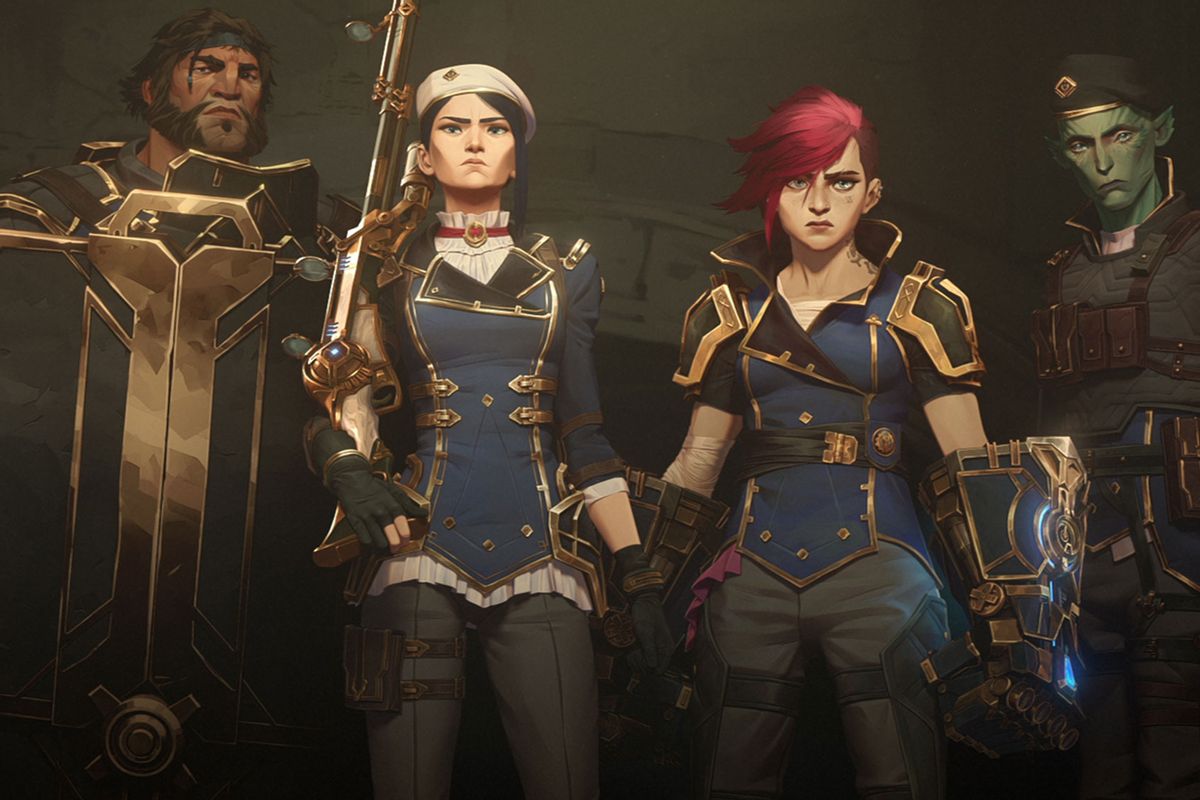On Election Day, millions of Americans elected a Republican national ticket whose vice presidential candidate, JD Vance, regularly denounced women who avoid traditional lifestyles as “childless cat ladies.” At the top of that ticket, President-elect Donald Trump is notorious for pandering to prejudices against women, racial minorities and the LGBTQ+ community. Perhaps unsurprisingly, Trump prevailed despite a significant gender gap between female and male voters, with Trump’s opponents expressing deep distress over his victory while his supporters publicly gloated about those same people's pain.
You can't separate the political from the personal, at least when the political differences become so very stark.
Into this all-too-real context Netflix plunks the second season of “Arcane,” the vividly colorful and fast-moving adult animated steampunk adventure series based on Riot’s “League of Legends” video games. On the surface, nothing could seem less connected to Trump’s recent reelection than a TV series featuring a brilliant scientist who looks a bit like an upright walking cat, a blue-haired vigilante, a drug-dealing talking rodent and a seemingly all-powerful technology called Hextech.
By the end of the first season, however, the potential parallels between the world of “Arcane” and the one of Trump became increasingly clear. Series antihero Jinx (Ella Purnell), devastated at a terrible personal loss and traumatized by the injustices she has suffered as the resident of the oppressed community of Zaun, launches a terrorist attack against the governing council of the ruling community, Piltover. In so doing, she drastically alters the relationships of all the show’s major characters — and forces two characters’ budding relationship into an unexpectedly political place.
 Ella Purnell as Jinx in "Arcane" (Netflix)This is why, beneath the pulse-pounding action sequences and deep-dish fantasy worldbuilding, “Arcane” is also a surprisingly vulnerable exploration of how reactionary politics wreak havoc on interpersonal connections. In this case, that theme is brought to the fore in the subplot involving Jinx’s estranged sister Vi (Hailee Steinfeld) and her close friend from the first season, Caitlyn (Katie Leung).
Ella Purnell as Jinx in "Arcane" (Netflix)This is why, beneath the pulse-pounding action sequences and deep-dish fantasy worldbuilding, “Arcane” is also a surprisingly vulnerable exploration of how reactionary politics wreak havoc on interpersonal connections. In this case, that theme is brought to the fore in the subplot involving Jinx’s estranged sister Vi (Hailee Steinfeld) and her close friend from the first season, Caitlyn (Katie Leung).
At the close of last season, many fans wanted to know if these two would ever hook up. The answer to that question is a resounding “Yes,” but comes with a twist — the romance does not last, as the latter’s privileged background and thirst for revenge combine to make her a more-than-willing instrument for totalitarianism.
In a key scene it is established that once Caitlyn’s politics became monstrous, her personal life would inevitably follow. In her zeal to bring Jinx to justice and end the Zaun uprising, Caitlyn tries to shoot Jinx even though doing so would needlessly endanger a child. Without knowing any details, Caitlyn disregards that a young girl throws herself upon Jinx to protect her when she senses that she is in danger. Before the moment has passed, the once-admirable warrior we were emotionally trained to root for has actually taken a shot near the kid, and shortly thereafter assaults Vi with the butt of her gun when the latter has the temerity to challenge her.
In this respect, “Arcane” in its second season is the perfect show to complement the actual universe’s biggest ongoing battle against fascism, the 2024 presidential election. It demonstrates that love, though perhaps the world’s most beautiful emotion, is not necessarily the most important one, at least not when oppressive politics become involved.
The American Survey Center in 2020 learned that 55% of young women would be less likely to date a Donald Trump supporter, with 39% saying the same thing about dating a Republican. The gap is even larger among educated women, as more than three-fourths of those with a college degree (76%) likewise say they would not date anyone who backs our once and now future president. Overall 75% of unmarried young women have a “very unfavorable” view of Trump himself, with that hostility naturally spilling over to his supporters.
While mainstream media outlets like “The Washington Post” denounce women who spurn pro-Trump men (with CNN getting in on the action by criticizing a somewhat-rarer but still prevalent phenomenon, men spurning pro-Trump women), Salon’s Amanda Marcotte observed last year that there are logical personal as well as political reasons to not date a Trump supporter. If you are either a woman or genuinely care about women, backing Trump is a lot different from supporting your run-of-the-mill Republican. It speaks to how you are likely to behave in a relationship.
“For women, in particular, it's about being able to be safe and respected inside your own home, which is a very minimum standard all people deserve,” Marcotte wrote. “Voting for Trump means backing a man who has been accused of sexual assault by two dozen women, and who a judge and jury deemed responsible for rape. It means backing the man who repeatedly brags that he got Roe v. Wade overturned.”
Want more health and science stories in your inbox? Subscribe to Salon's weekly newsletter Lab Notes.
"Arcane" strips away any illusions of selflessness . . . in the process also holding a mirror up to fascist America circa 2024.
Marcotte supplies examples about how people who back these things when they cast their ballot tend to also do so outside the voting booth. Pro-Trump thought leaders like Tucker Carlson, Joe Rogan and the Proud Boys are explicitly sexist. Online men fetishize subjugating women and making them like it through their “trad wife” fantasies, while Trump-world heroes like Twitter CEO Elon Musk joke about impregnating liberal women like pop star Taylor Swift. If they fall too far down the rabbit hole, such as by believing in Trump’s Big Lie that he won the 2020 election or the QAnon claims of Jewish world control, they often alienate themselves from loved ones who do not share those extreme views.
With this context, it is unsurprising that 1 out of 8 women say they have voted differently from their husbands without telling them, with Trump supporters responding with characteristic rage. Yet for authentic fascists to understand why people shy away from close relationships with them — romantic and otherwise — they need look no further than “Arcane” Season 2.
 Katie Leung as Caitlyn and Hailee Steinfeld as Vi in "Arcane" (Netflix)The series works as an ideal analogue for this because, to the credit of a writing team led by Christian Linke and Alex Yee, we are made to understand both sides of this world’s fascistic conflict. The residents of Piltover enjoy the privileges of life in an affluent and powerful society, one that casually oppresses the impoverished inhabitants of Zaun. On the surface, it appears that Piltover is simply villainous and Zaun simply victimized, but the truth is more complicated. Most people in both regions are innocent, and when violence breaks out because of Zaun criminals and/or militants, these civilians rely on “blue bellies” (Piltover law enforcement) to protect them. The gender divide in our real world is underplayed in the “Arcane” universe, but relationships between individuals are contaminated by a similarly vicious strain of the x-word itself, xenophobia — in the “Arcane” universe, between residents of the symbiotic communities of Piltover and Zaun.
Katie Leung as Caitlyn and Hailee Steinfeld as Vi in "Arcane" (Netflix)The series works as an ideal analogue for this because, to the credit of a writing team led by Christian Linke and Alex Yee, we are made to understand both sides of this world’s fascistic conflict. The residents of Piltover enjoy the privileges of life in an affluent and powerful society, one that casually oppresses the impoverished inhabitants of Zaun. On the surface, it appears that Piltover is simply villainous and Zaun simply victimized, but the truth is more complicated. Most people in both regions are innocent, and when violence breaks out because of Zaun criminals and/or militants, these civilians rely on “blue bellies” (Piltover law enforcement) to protect them. The gender divide in our real world is underplayed in the “Arcane” universe, but relationships between individuals are contaminated by a similarly vicious strain of the x-word itself, xenophobia — in the “Arcane” universe, between residents of the symbiotic communities of Piltover and Zaun.
As such, when Jinx commits her terrorist attack, both the immediate victims and Piltover citizens overall are aggressively dismissive of arguments about Zaunian social justice. Caitlyn embodies this point of view both because of her social status and because of her immense personal loss during Jinx’s attack. At one point, she reflects, “I understand now how easy it is to hate them. One vicious act.” And that is before Zaun radicals violently attack a memorial service honoring the survivors of Jinx’s atrocity. After that, she calls residents of Zaun “animals” because of those terrorists, right in front of a now-empathetic Vi.
Initially Vi is at the other end of the extreme from Caitlyn. Born and bred in Zaun with a long criminal background, Vi is as rugged and misanthropic as Caitlyn is sleek and chic. Passionately hating law enforcement for murdering her parents, Vi at first rejects the badge Caitlyn offers her early in their burgeoning romance. It is perhaps not a coincidence that when Vi and Caitlyn finally consummate their relationship, the literal seduction is linked to Vi’s figurative succumbing to Caitlyn’s politics: She accepts the badge, with all of the raw emotion of a zealous new recruit to a supposedly noble cause. (Tangentially, “Arcane” Season 2 deserves credit for its matter-of-fact depiction of this lesbian relationship.)
Yet as Vi and the audience quickly sees, Caitlyn’s cause is not noble. By its very nature, it cannot be noble; it depends on lies that vilify an entire population and maintaining an inherently oppressive status quo. Even worse, the leaders’ valid grievances are mixed with malice, their contempt for Zaun dripping from every syllable uttered by Piltover elites like Salo (Josh Keaton) and Ambessa (Ellen Thomas). While they speak of things like “justice,” the Piltover politicians and police do so with an incomplete understanding of the word because they regard Zaun life as cheap. Caitlyn makes this clear during a pivotal scene when she follows the literal letter of Vi’s advice to “take the shot” if she sees an opening by endangering the aforementioned Zaun child.
When Vi stands up to Caitlyn for making this immoral decision, Caitlyn shows that the prejudice she feels for other Zaun natives can be extended even to the one she claims to love. Instead of simply disagreeing, Caitlyn assaults Vi by striking her in the abdomen with the butt of her rifle. In the context of this scene and their relationship, Caitlyn's act of violence reads more as an attempted depiction of domestic assault than standard action TV show fare. Soon thereafter Vi is abandoned by yet another trusted loved one, while Caitlyn is rewarded for her hardened attitude against Zaun with raucous applause and a promotion.
 Katie Leung as Caitlyn in "Arcane" (Netflix)Caitlyn abandons the benevolent disposition that marked her character previously, becoming fixated on revenge and fulfilling her professional vanity. In so doing, “Arcane” strips away any illusions of selflessness even as it acknowledges her valid pain, in the process also holding a mirror up to fascist America circa 2024. There are millions of Trump supporters who struggle due to economic injustice or personal tragedies, and therefore legitimately deserve sympathy. Yet they have also had their fears and prejudices manipulated by reactionary social forces or believe they will somehow benefit from the maintenance of an oppressive status quo, to say nothing of the creation of an even more oppressive alternative under the pro-plutocracy, pro-white nationalist, pro-patriarchy Trump. Even those who do not share Trump’s prejudices are, at best, prioritizing partisanship over supporting democracy (which America’s first president, George Washington, feared would lead to democracy’s downfall), as they valued voting against Democrats so much that they supported a Republican nominee who attempted a coup on Jan. 6, 2021.
Katie Leung as Caitlyn in "Arcane" (Netflix)Caitlyn abandons the benevolent disposition that marked her character previously, becoming fixated on revenge and fulfilling her professional vanity. In so doing, “Arcane” strips away any illusions of selflessness even as it acknowledges her valid pain, in the process also holding a mirror up to fascist America circa 2024. There are millions of Trump supporters who struggle due to economic injustice or personal tragedies, and therefore legitimately deserve sympathy. Yet they have also had their fears and prejudices manipulated by reactionary social forces or believe they will somehow benefit from the maintenance of an oppressive status quo, to say nothing of the creation of an even more oppressive alternative under the pro-plutocracy, pro-white nationalist, pro-patriarchy Trump. Even those who do not share Trump’s prejudices are, at best, prioritizing partisanship over supporting democracy (which America’s first president, George Washington, feared would lead to democracy’s downfall), as they valued voting against Democrats so much that they supported a Republican nominee who attempted a coup on Jan. 6, 2021.
In other words, while millions of Trump supporters are still decent human beings, the parts of them that support Trump’s fascistic policies and practices — the contempt for democracy, the appeals to hate against women and minorities and poor people, the opposition to democracy, the disregard for facts that contradict their narrative — are most definitely not decent.
Reactionary politics wreak havoc on interpersonal connections.
You can't separate the political from the personal, at least when the political differences become so very stark. Regardless of the moral questions involved in associating with fascists, in practice there are consequences to holding a philosophy based on hate. Once you believe that your group is inherently socially superior to a designed “out group,” and that they have the right to enforce this superiority through force, that belief warps and distorts the rest of your character.
No matter how hard you try, it cannot stay out of the realm of your relationships. It doesn’t just impact your political decisions, such as Caitlyn deeming a potential child casualty as an acceptable sacrifice for her agenda. It also impacts your personal choices, such as when Caitlyn strikes Vi, then quickly abandons her.
Unlike something ineffable — such as a person’s place of birth, race, sex or gender — political ideology is a choice. Because we are all capable of making political choices that harm others, it is reasonable to hold people accountable for those decisions. For them to be forgiven, those who have embraced hate and cruelty need to admit that their political choices were wrong. Just as importantly, they need to change their political views. Without such a reckoning, Caitlyn will never be able to be a good partner to a woman from Zaun like Vi, no matter how much she may also love her.
The same, alas, is also true for the people who back Trump over the humanity over their supposed real-world loved ones.
The first three episodes of "Arcane" Season 2 are streaming, with additional episodes to be released Nov. 16 and Nov. 23.
Read more
about this topic



Shares